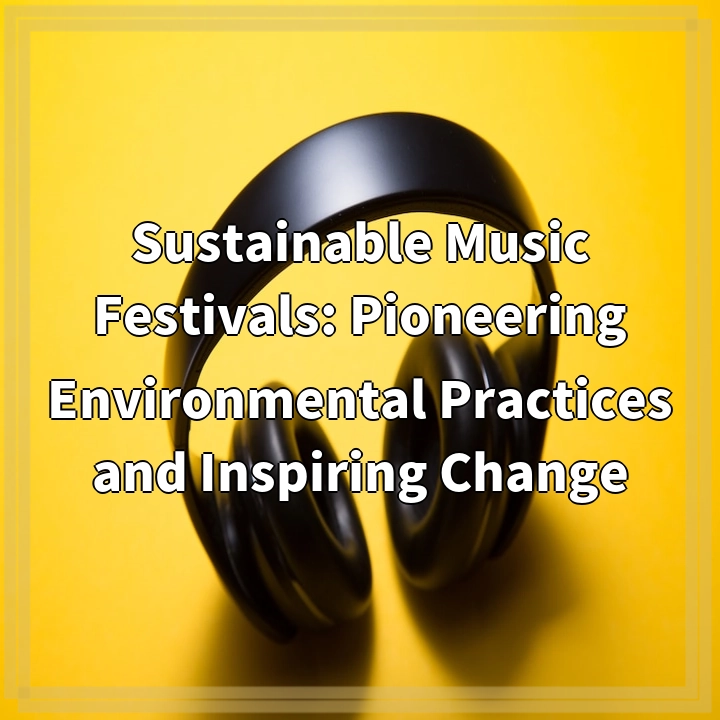
What is Sustainable Music Festivals?
Sustainable music festivals are events that aim to minimize their environmental impact and promote eco-friendly practices. These festivals prioritize sustainability in various aspects, including waste management, energy consumption, transportation, and community engagement. By implementing innovative and sustainable practices, these festivals prioritize environmental responsibility while still providing an enjoyable and memorable experience for attendees.
Real-World Problems Associated with Sustainable Music Festivals
1. Waste Management
One of the main challenges faced by sustainable music festivals is effectively managing the significant amount of waste generated during the event. Festivals often produce large volumes of single-use plastic, food waste, and other non-recyclable materials. Finding sustainable solutions for waste management, such as recycling infrastructure, composting programs, and reusable drinkware, is crucial to reduce the festival’s environmental footprint.
2. Energy Consumption
The energy demands of music festivals, particularly those lasting multiple days, can be significant. Powering stages, lighting, sound systems, and vendor areas requires a substantial amount of electricity. Sustainable festivals strive to minimize their energy consumption by using renewable energy sources, such as solar panels or wind turbines, and by implementing energy-efficient technologies. Balancing energy needs while minimizing carbon emissions is a key challenge for organizers.
3. Transportation
Transportation to and from music festivals can have a significant environmental impact. The sheer number of vehicles on the road contributes to carbon emissions and traffic congestion. Encouraging festivalgoers to use public transportation, carpooling, or providing shuttle services can help reduce the carbon footprint and alleviate traffic-related issues.
4. Community Engagement
Engaging the local community and promoting sustainable practices beyond the festival grounds is also a concern. Festivals should work with local businesses, organizations, and residents to ensure minimal disruption and maximum benefit for the community. This involves addressing concerns such as noise pollution, waste management, and promoting positive relationships between the festival and the local community.
5. Financial Sustainability
While aiming for sustainability, festivals also need to be financially viable. Implementing sustainable practices often involves additional costs, such as investing in renewable energy infrastructure or recycling programs. Finding the right balance between sustainability and financial feasibility is crucial for the long-term success and growth of sustainable music festivals.
By addressing these challenges and continuously seeking innovative solutions, sustainable music festivals have the potential to inspire change in the industry and create a more environmentally conscious event experience for both attendees and organizers alike.

Solutions for Sustainable Music Festivals
Addressing the real-world problems associated with sustainable music festivals requires innovative solutions and proactive measures. Here are some key strategies that can be employed:
1. Waste Management Solutions
Sustainable music festivals can implement comprehensive waste management strategies to minimize the environmental impact. This includes setting up recycling stations throughout the festival grounds, providing clearly labeled bins for different types of waste, and promoting the use of reusable or biodegradable food and drink containers. Furthermore, educating festival attendees about proper waste disposal practices can significantly improve recycling rates and reduce overall waste production.
2. Energy Conservation Measures
To address the energy consumption challenge, sustainable music festivals can focus on energy conservation and renewable energy sources. Implementing energy-efficient technologies, such as LED lighting and low-energy sound systems, can significantly reduce electricity usage. Additionally, festivals can invest in renewable energy infrastructure, such as solar panels or wind turbines, to power stages and other festival areas. Balancing energy demands with sustainable energy solutions is essential for reducing the environmental impact.
3. Sustainable Transportation Initiatives
Promoting sustainable transportation options is crucial for reducing the carbon footprint associated with music festivals. Organizers can encourage attendees to use public transportation, carpooling, or provide shuttle services from nearby cities or transport hubs. Furthermore, offering incentives for those who choose eco-friendly transportation options, such as discounted tickets or priority access, can motivate festivalgoers to opt for greener transportation methods.
4. Community Engagement and Collaboration
To ensure a positive relationship with the local community, sustainable music festivals can actively engage with residents and businesses. This can involve open dialogues to address concerns, seeking feedback, and partnering with local organizations or charities to create meaningful initiatives. By involving and benefiting the local community, festivals can build stronger connections and create a more sustainable and harmonious event.
5. Financial Sustainability Planning
While implementing sustainable practices, festivals need to carefully manage their finances. This can be achieved by developing a comprehensive sustainability plan that considers both environmental and economic factors. Seeking financial support from sponsors who share the same values, implementing revenue-generating initiatives such as eco-friendly food vendors or merchandise sales, and seeking grants or funding opportunities that support sustainable initiatives can help ensure the financial sustainability of music festivals.
By adopting these solutions and continuously innovating, sustainable music festivals can lead the way towards a more environmentally responsible and enjoyable event experience for all.















